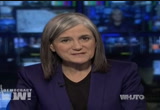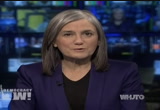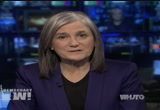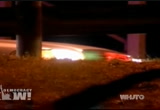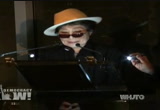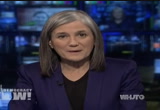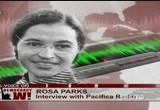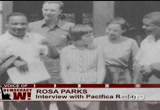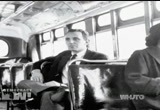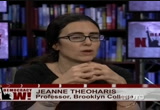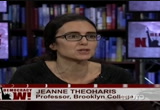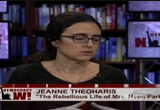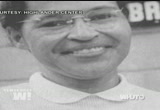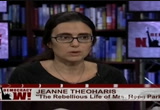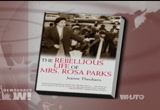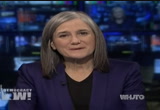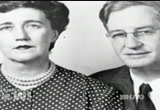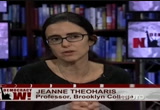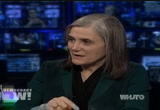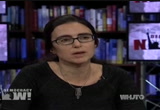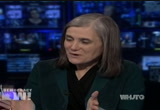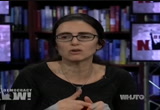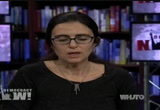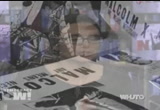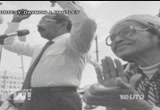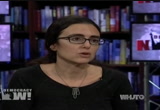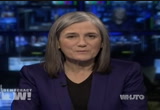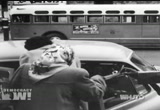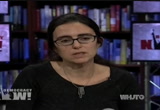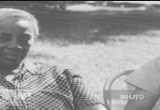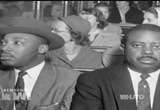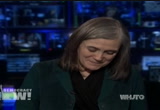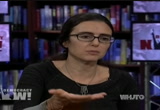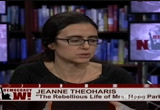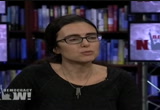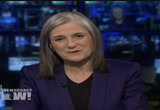tv Democracy Now WHUT February 4, 2013 6:00pm-7:00pm EST
6:00 pm
02.04.13 02.04.13 >> from pacifica, this is democracy now! >> he had looked back and ask that three seats that i had taken, along with two across the aisle where i was seated, he demanded the seeds that we were occupying. the other passengers reluctantly give up their seats but i refused to do so. >> 100 years ago today rosa
6:01 pm
parks was born. she refused to give up her seat to a white passenger on a city bus in montgomery, alabama. an act of resistance that launch the modern-day civil rights movement. today, we spend the hour looking at her life. >> we have one of the most famous americans of the 20th- century treated like a children's book hero, not seen as being worthy of a substantive, scholarly treatment. that is what surprised me and continues to surprise me, the ways that we diminish her legacy by making it about a single day, a single act, as opposed to the rich and lifelong history of resistance that was actually who rosa parks was. >> we speak with historian jeanne theoharis, her new book, "the rebellious life of mrs. rosa parks."
6:02 pm
all that and more coming up. this is democracy now!, democracynow.org, the war and peace report. i'm amy goodman. the obama administration has granted itself the right to launch a pre-emptive strike on foreign targets. cyber attacks would be carried out, should the what has been the necessary, to prevent an imminent and dangerous attack from abroad. the authorization was part of a pending set of rules for cyber warfare. it would fall under the operations of the pentagon's recently created cyber command. computer systems during the olympic games disabled systems in iran. the measure would allow church and religious groups to exclude birth control from the insurance
6:03 pm
they provide employees. a separate insurance company would then provide birth control coverage. insurance companies would pay higher fees for access to the new customers. aral said that, nra a this would make universal contraceptive a reality. the dead included 10 civilians when rockets struck their nearby home. the pakistan taliban claimed responsibility for the attack, calling it revenge for a recent u.s. drone strike. the violence comes after a monthly record for u.s. drone strikes inside pakistan in more than a year. at least 33 people were killed in iraq on sunday when suicide attackers bombay police station. france continues to fight in
6:04 pm
mali. french forces have launched a number of aerial attacks in a bid to secure control of the rubber -- rebel holdout of kidal. a top commander was arrested earlier today near the border with algeria. amnesty to national is calling for an independent probe of civilian deaths in mali. dai thanh mou to describe an event were civilians were killed without warning. >> we asked if there were any warnings to the civilians who were there. they told us there had been no warnings at all. we sent a letter to the defense minister and asked him to launch an independent, impartial inquiry regarding the deaths of those four people. >> and the state is also seeking out a probe of other incidents involving the ethnic groups
6:05 pm
linked to the arabs in the north. iran has expressed willingness to engage in direct talks with the u.s. officials say that they are receptive to vice president biden pasquale to direct initiations. egyptian forces have sparked a new outbreak with the release of videos showing the brutal beating of a protester. on the tape, the victim is being seen stripped naked, dragged across the ground, and beaten by half a dozen officers. his beating capped a week in which protests went on against mohamed mursi. in the philippines, the damage to a coral reef is far worse than previously thought. the u.s. as guardian has been stranded in the marine park
6:06 pm
since january. after commanders ignored warnings from park rangers. the navy says it will be forced to dismantle the ship in order to save remove it. the reef is a unesco world heritage site. new figures show the suicide rate for u.s. veteran has increased about 20% since 2007. a study by the department of veterans affairs says close to 22 veterans take their life each day. one army veteran has been arrested in texas for shooting dead two men on a gun range. any ray routh had gone shooting with the two victims. kyle was a former navy seal who gained notoriety while in iraq. he recently spoke out against increased gun control. kyle had a routine of taking troubled u.s. veterans to gun ranges as a form of therapeutic
6:07 pm
relief. a somali american man has been found guilty of trying to detonate a bomb supplied by undercover agents in portland. a attorneys for mohamed osman mohamud accused the fbi under entrapment. he was blocked from leaving the portland area from taking another job. he could face life in prison. leon panetta has played down the role of cia torture in gathering the intelligence that led to the discovery of the location of osama bin laden. he said while torture techniques were used, he would have been found without them. >> in order to put the apostle of intelligent together that led us to bin laden, there was a lot of intelligence, a lot of pieces out there. some of it came from the tactics
6:08 pm
that were used at that time, but the fact is, we put together most of that intelligence without having to resort to that. i think we could have gotten bin laden without that. >> the family of an unarmed african teen shot by new york police in his own home has filed a lawsuit one year after his killing. ramarley graham was shot and your second 2012 after being chased by narcotics officers. he was trying to empty a bag of marijuana into the toilet when he was killed. in the lawsuit, the family says that the nypd attempted to kill his grandmother, who witnessed the shooting. the officer was charged with manslaughter. hundreds of people marched to a bronx precinct to mark the first anniversary of his death. a federal appeals court has
6:09 pm
ruled the permit keep secret its efforts to pursue the private information of internet users without a warrant as part of its probe into wikileaks. the case involves three people involved whose twitter records were sought out by the apartment, including security securitresearcher. the court rejected a request related to the three individuals that may have been sent to other companies. julian assange was honored in new york this week with the yoko ono lennon for rich reward for the arts. in a ceremony at the museum of modern art, yoko ono paid tribute to julian assange and accenture out. >> is 2013 courage award is presented to julian assange. with your courage, the truth was
6:10 pm
revealed to us. thank you. it gave us wisdom and power to shield the world. on behalf of the suffering world, i thank you. yoko ono lennon. >> that was yoko ono. she turns 80 this year. this is democracy now!, democracynow.org, the war and peace report. i'm amy goodman. 100 years ago today, civil rights pioneer rosa parks was born. it was february 4 1913. on dec. 1st 1955, when she was 42 years old, she refused to give up her seat to a white man on a city bus in montgomery, alabama. she was arrested. her act of resistance led to a 13-month boycott that would spark the modern-day civil rights movement and launched dr. martin luther king jr.. he wanted a to a clip of rosa
6:11 pm
parks in the midst of the boycott. she spoke to pacifica radio about actions she took. >> i was on my way home about 6:00 in the afternoon. i had boarded the bus downtown in montgomery at pope square. the bus proceeded out of town. on the third stop, the white passengers had filled the front of the bus. when i got on the bus, the rear was colored -- filled with colored passengers, and they were beginning to fan. the seat i occupied was the first where the negro passengers, where they take on this route. the driver noted that the front
6:12 pm
of the bus was filled with white passengers and that there would be two or three men standing. he looked back and asked that the seed i had taken, along with three other places, one where i was, two across where i was seated, he adds that we give up our seats. the other two over the the the did so but i did not. i said i had not taken a seat in the white section, as had been reported in many cases. an article came out on friday morning about the negro woman who overlooked segregation. she was seated in the front seat and refused to take a seat in the rear of the bus. that was the first newspaper account. the seat where i occupied, we
6:13 pm
were in the custom of taking this seat on the way home, even though at times, on the same bus route, we occupied the same seat with white standing, if their space had been taken that, if their seats had been taken up. i was surprised. the driver, at this point, the man that i remove myself. the driver said, if i refuse to leave the seat, he would call police. i told him to call the police. he then called the officers of the law. a place to be under arrest, a violation of segregation laws in birmingham, alabama. i felt i had not been treated right and had the right to retain the seat. the time had come when i was
6:14 pm
pushed as far as i could stand to be pushed, i suppose. >> > that was rosa parks. rosa parks is often described as a tired seamstress, no trouble maker. the fact was, she was a troublemaker, a first class one. at the time of her arrest, she was secretary of the local naacp. she had sat down on the bus before and refused to get out for what passengers. when she died in 2005, she became the first african- american woman to lie in state at the capitol rotunda. i recently sat down with jeanne theoharis, author of the book "the rebellious life of mrs. rosa parks."
6:15 pm
she is a professor of civil rights at brooklyn college. i began by asking her to tell us a story about rosa parks. >> this is a life story of activism. this starts decades before her starke but stand, and continues after. the story i am trying to tell in the book is that scope. her grandfather was a supporter of marcus garvey, and that is where she got her start, with her family. her mother and grandparents. they inculcate hurt in the sense of pride, the sense that you demand and expect respect from people around you. it is that spirit that she brings into the world, she married raymond parks. >> marcus garvey was?
6:16 pm
>> he headed the universal negro improvement association. he was a pan africanist and a proponent of black nationalism, black pride. her father was a supporter. she meets her husband raymond parks. he is working on the scottsboro case. these are nine young men ages 12 to 19 who get arrested riding the rails. this is the great depression. quickly, the charge turns to rape, and all are sentenced to death, except the youngest one. >> these are black teenagers and when young women? >> basically, these young boys are riding the train even when they get arrested, it is discover that there are two young women running the train. that is when these nine young men -- the charge then turns to
6:17 pm
rate. they were not originally charged with rape. this support defense committee grows to defend these nine young men paid raymond parks is part of that movement. he is sort of the first activists that she met. her political development starts would be in a newly wed with raymond and working on the scottsboro case. >> what happens to the boys? >> ultimately, they are not executed. in 1943, she sees a picture of a classmate attending a local naacp meeting, and realizes women could be part and decides to attend a monday meeting. she is the only woman there. they are having branch elections, so she is elected
6:18 pm
branch secretary at her first meeting. that begins a decade of activism before her boss arrest where she is working with the naacp, working with a man named the nixon. nixon is a sleeping car porter, active in the union. he and rosa parks wants to transform the bridge into a more activist branch. he runs for president and wins in 1945. he and parks go out to investigate cases of voter registration, acts of brutality. there is controversy in the branch, many that oppose this, they try to unseat nixon and parks. she is doing this very dangerous work.
6:19 pm
it sounds not so dangerous but to see -- be a naacp activist in the 1940's, taking testimony of people, getting them to sign affidavits, that is extremely courageous work. only a handful of people in montgomery were committed to doing that work. >> how does this moment happen? as you point out in the book, it was not the first time that rosa parks had refused to get up on the bus. explain what was different, when she tried it the first time, compared to 1955? >> there is a longer history of resistance on buses in montgomery. there have been numerous cases after world war ii of people getting arrested on the bus.
6:20 pm
she knows what can happen. a neighbor of hers in 1950 is thrown off the bus and killed by police. claude that colton is manhandled by police in 1955 when she refuses to move. parks herself had made various stands on the bus. she and for the practice that many insisted upon where blacks would have to pay in the front of the bus, get off, and henry board in the back. she had been kicked off by the very same bus driver the day before by refusing to do that. she describes some bus drivers passing her by because he felt like she was going to raise trouble. she had this history of resistance. there is a larger history of resistance in montgomery. then we get to december 1st, 1955.
6:21 pm
one other thing, that summer in august, she had gone to a workshop they were talking about school desegregation. we have the historic decision in 1954, brown birth -- versus board of education. then the supreme court comes back in 1955 and refuses to put a timetable on it. so, activists, like rosa parks, -- there is a workshop in tennessee for people that want to implement school desegregation because the court will not press it forward. she attend this workshop. it is a very important and transformative time for her. she described it as the first time she could discuss things with my people and not feel hostility. there were 40 people attending
6:22 pm
the workshop. everyone was committed to school desegregation. her own spirit lives. she talks about love and miles horton's sense of humor. getting to eat and be in a interracial space, people eating together, they shared rooms, they sat outside together. that freedom was also transformative, personally. she comes back, and in some ways, the atmosphere of segregation in montgomery becomes harder to bear, i think. the evening of dec. 1st, 1955, she had gotten off work. she decides to wait for a less crowded bus, she grows to the drug store and buys a few things and boards around 5:30 at night. she sits in the middle section.
6:23 pm
the middle section was sort of a no-man's land, in that the bus driver could ask you to move from that section even though montgomery city code at the time said that black people did not have to get up out of their seats if there were none available. but bus drivers routinely violated that code. that night, she is in the middle section. there are four black people in the row. at the third stop, the bus fills up and there is one white man standing. by the terms of segregation, all four people would have to get up so that one white man could get down -- sit down. the bus driver, james blake, like all drivers in the area but is carrying a gun. they refused to get up. he said that he will have them arrested. he gets off the bus and first
6:24 pm
calls his supervisor. he says, get her off the bus. the supervisor repeats that, get her off. he does not say have her arrested. glycols belief and has heard evicted. blake is the one that takes the historical step. all the drivers in montgomery are white. one of the lesser-known facets of the bus boycott is that it is also pressing for black bus drivers. she describes also in those moments, while blake is calling, people are grumbling, a nervous about what will happen. the police take her off the bus. blake says that he wants to sign a warrick. they take her to jail. she describes the moment in various ways.
6:25 pm
that she had been pushed as far as she could be pushed. to get out meant that she had consented, but she did not. one of my favorite passages, she talks about finding her arrest and annoying. this speaks to the fact and she movement will happen. she thinks this is important. she is working on this youth workshop and she sees this as a distraction. now she has done herself arrested. who knows how long this will take, what will happen, whether or not anything while it will happen to hurt. in that moment, is a very hard moment, also a moment in which she cannot see what is about to happen. >> jeanne theoharis is the author of the new book "the rebellious life of mrs. rosa parks." we will continue our conversation in a minute.
6:27 pm
shall overcome." we continue our conversation with jeanne theoharis, author of "the rebellious life of mrs. rosa parks." and asked her how long rosa parks was detained and what she did next. >> she is held for about four hours. she calls home. her mother is terrified. her husband starts to get money to get to come get hurt. meanwhile, someone on the bus goes to tell edie nixon. he cannot find any information, so he calls a company and gets clifford, a lawyer, to codify that would happen to her. so both raymond, nixon, and the
6:28 pm
others come down to bail her out. they all come down -- >> derr is a famous activist. >> yes. they all go back to the park to talk but what is happening. once she is ok, it is ok. he trusts that she will not flinch under the pressure that will be brought to bear. so he wants her to be a test case. at first, her husband is no. -- nervous for her safety and air safety but also because people had not necessarily state to get around other cases. they decide that she will go forward with the case. she called a young friend and lawyer of hers by the name of
6:29 pm
fred gray, to ask him to represent her. fred gray calls joanne robinson, a professor at alabama state. the women's political council had been active around these issues. joanne robinson mobilizes that night and called for a one-day boycott on monday when parks will be arraigned in court. robinson sneaks into alabama state college in the middle of the night and runs out 35,000 leaflets in the middle of the night. she calls the scene in the morning and said this is what we are planning. at 5:00 in the morning, nixon calls ministers in town to get them on board with this plan. it is not until midday, when rosa parks takes her lunch, that she finds out what is happening. they are planning for a one-day
6:30 pm
boycott on this monday. people are worried. will people do it, will they stick together? monday comes and it is amazing. she describes it as the best moment of the whole thing. that night, at a mass meeting, people decide to carry on the boycott. >> they choose a young minister who has just come into town to be their leader, dr. martin luther king. >> they choose him for many reasons, he is new, young, he is not from the align with one side or the other. his church is located downtown right across from the capital, so the minister's have the first meeting at his church, in part on the idea that it is so central located. king also did not have any
6:31 pm
enemies in town. it is there where we get the first taste of martin luther king being political and his oratorical brilliance. the speech that he gives that night is brilliant. >> rosa parks helps to launch dr. martin luther king. >> yes, she does. in many ways, there is this interesting moment. on monday, she goes to court, is quickly convicted. then she goes back with fred graham to his law offices. she worked at montgomery fair, an assistant taylor. she was working in the men's shot. she does not go back to work. she answers phones in fred gray's office that monday, but the center of people it was her.
6:32 pm
she wants to be useful, so she is answering these calls, people wonder what they should do, she does not say that it is rare, and then meanwhile, nixon, gray, and king have a meeting about what is going to go on. she is doing the behind-the- scenes work of the leadership is being formed. >> you talked about december death aing after the fethe few months earlier of emmett till. describe what happened and how rosa parks was affected by that? >> the lynching happens in august 1955. days before she makes her stand,
6:33 pm
they had this mass meeting. because of the attention to the lynching, the two men are put on trial, which is rare, but they are acquitted. so a campaign comes up to raise awareness around this, organized in part by his mother and tdm howard. they had this mass meeting just days before. it is very much on her mind. when she talks about sitting there in those moments, she talks about thinking about her grandfather, thinking about emmett till -- >> when had he come into town? >> the point your or five days before her arrest. >> at the end of november, right after thanksgiving.
6:34 pm
>> yes, so the organizing was very fresh. the lynching came in august but the movement to raise awareness is coming just days before her bus stand. so she is very much thinking about that. the bus driver says, the law should make a light under cells and get up. she is thinking, this is not making its light for ourselves. she thinks about emmett till, the klan come in by her parent'' house. it is with her that day. >> her grandfather would often sit outside at night with a gun to protect them. after world war i there is this backlash partly against black service, and uptake of violence.
6:35 pm
that also comes at a time in alabama where she grew up. she talks about remembering her grandfather sitting out on the porch with a gun, ready for the klan, if they come. >> we are talking to jeanne theoharis, author of "the rebellious life of mrs. rosa parks." when rosa parks and died in 2005, there was a huge memorial service in washington, d.c., the first african-american woman to lie in state at the capitol rotunda. i remember the networks talking about rosa parks. no question it was a big moment and the media took notice. cnn said that rosa parks was a tired seamstress, she was the troublemaker. but, as you point out, was a first-class troublemaker. so how did the image of her change? what did people understand of
6:36 pm
her at the time in 1955? >> there were two things that worked. certainly, during the boycott, a background of her political history for the safety of her. they play it down, put it on the back burner. they talk about her as a good, christian women. they do not foreground her political history, in part because -- this is 1955. this is the cold war. they are immediately renovated. all sorts of crazy rumors come out about her. she is an naacp plant, she is mexican -- all manner of rumors in montgomery spring up. in part, to counter the idea
6:37 pm
that these are outside forces coming to montgomery, there is a tendency to talk about her just as a local woman, a seamstress, christian. in the decades afterwards, that takes on a life of its own, in terms of her political history. rosa parks also leaves montgomery in 1957 and spends the second half of her life in detroit, fighting the racism of the jim crow no.. she leaves the south and this movement, and she has this new place in which she is struggling in, and that is not getting the same kind of attention. by the 1990's and 2000's -- in many ways, in the wake of the
6:38 pm
establishment of the king holiday we see the history of the hall they get reshaped and twisted it into this story of an american movement that rises up and changes america and then we vanquished racism, and then there is martin luther king and rosa parks. that is a very happy story, makes us feel good about ourselves as a nation, and that story, i think, is at the center of the kind of national spectacle. >> who was rosa parks hero? >> she describes it as malcolm x. she loved, admired -- she had tremendous admiration for king, but she describes of the backs as her personal hero. she was a lifelong believer in
6:39 pm
self defense. she gets that from her grandfather. malcolm x.'s willingness to talk about northern liberalism, hypocrisy. malcolm x early opposition to the vietnam war. all of these things are similar to her political outlook, and therefore, looked to him. >> that is interesting, talking about vietnam. you write about rosa parks as being an internationalist. >> she is an early opponent of the war, as well as john conyers. she volunteers on john conyers' first campaign. >> dean of the congressional black caucus. >> michigan gets a new congressional seat in 1964. it looks but they may elect a second african american to congress.
6:40 pm
this young civil-rights lawyer is running on this platform of jobs, peace, and justice. he is running on the anti-39 platform. rosa parks is attracted to this, volunteers for his campaign in 1964, and gets martin luther king to come to detroit on behalf of conyers. for the most part, and king is staying outside of the stuff, but he cannot say no to her. this is a crowded primary. conyers wins by less than 100 votes. one of the things he believes contributes was king coming. and part of what gets came to detroit is rosa parks asking him. one of the first thing that conyers does is he hires rosa parks to work in his detroit office. he is in the forefront to the opposition to vietnam. both of them are working on
6:41 pm
that, so she is part of the women's international party for peace and freedom. >> those hearings are held in detroit, john conyers is one of the voices to bring the hearings to congress. >> when john kerry became famous, the soldan that return and testifies against the vietnam war. >> absolutely. that happens in detroit, happens through conyers working on this. >> why didn't rosa parks run for congress when the second seat opened up in detroit? >> she is not somebody who
6:42 pm
seeks our want that public limelight. she finds her fame hard to bear. she is a stalwart activist, a steadfast activist, but conyers talks about her speaking with her presence. she went to tons of things, did what she could do to support prisoner defense committees, the anti-read numb -- all sorts of movements. but she does not like to be in the limelight in the wind up running for congress would have been. >> jane theoharis, author of "the rebellious life of mrs. rosa parks." when we come back, we speak with theoharis about what happened after she was -- parks was arrested and convicted. how she dealt with losing her job.
6:44 pm
>> in this black history month special on this 100th anniversary of the birth of rosa parks we continue our conversation with jeanne theoharis, author of "the rebellious life of mrs. rosa parks." i asked her what happened after rosa parks was arrested and convicted. how she dealt with losing her job. >> she is working at this department store downtown. they let her go. simultaneously, her husband is a barber at the air force base. they pass a rule that says there can be no talk of the boycott or that woman in the barbershop. for a politically proud man like rec and parks, that is untenable. so we are one month in and they have lost their jobs. so we have another year of the bus boycott. for the majority of the boycott they do not have steady work. she spends most of that year
6:45 pm
traveling the country, a fundraising for the montgomery improvement association and naacp, turning this local struggle into a national movement. part of what sustains the boycott is this amazingly organized car pool, but that requires money, so they send some of the minister's out, but they also send out rosa parks. so she is doing all this fund raising when her family is also in economic trouble. >> explain what happened in that year. african-american did not use the bus system in alabama. >> part of how they were able to do this for almost 13 months, they developed a car pool system where you pay the bus fare, 10 cents, and a set of these pickup stations across the city. you go there and then you can
6:46 pm
get a ride across town, if you need to go to work, go to the doctor, shopping. it is this elaborate system -- an independent transportation system. churches fundraiser and by vehicles to help there is this amazing cross-class solidarity where the couple and middle- class african-americans allow their cars to be driven. >> and the bus routes would remain empty? >> yes, bus fares go up and they start to cut routes. the majority of passengers are black people, so when they stop riding the bus, it takes a huge economic toll. there is a whole white segregationist movement, we have to stand up for the bus, give your money to the bus. this car pool is how they sustain this movement. it is a very organized movements.
6:47 pm
they realize they are going to need to do fund-raising outside of montgomery and rosa parks is part of that effort. when we talk about her role in the montgomery bus boycott we often forget even the role that she plays in sustaining the boycott itself. they are getting constant death threats and hate calls, so much so that her mother will talk on the phone all afternoon just to keep the line busy because both her mother and husband find the cause very upsetting. she is away a lot. she says it is harder on them than for her. even when the boycott ends, they have trouble finding work. they leave montgomery for detroit eight months after the boycott ends because they cannot find work. they're still getting death threats. there have been some pressure and hope that the montgomery
6:48 pm
improvement association would hire her. that does not happen. >> why? >> nixon and others are seen as outsiders, working class, they have this longueur political history. they are trying to start this alabama voter registration project, for traveling with the mississippi freedom democratic project will look like. she would have run it for all time. >> tell me what happened at the end of 1956. how did the bus boycott end? >> it ends because the supreme court rules that buses have to be desegregated. shortly after --
6:49 pm
>> for the whole country? >> for montgomery. she is arrested in december. these are seasoned activists. if they had got were read that it would be held up in court, her case -- in february, a new case is filed in federal court using other plaintiffs, other than rosa parks. the title of the case becomes broeder v. gayle. rosa parks is not part of that case, and adding that is for a couple of reasons. they do not want to risk it being thrown out because she had a separate case in state court.
6:50 pm
also they are worried by the naacp is being renovated. it would be outlawed in the state of alabama. >> how could it be outlawed? >> southern states come after the naacp, they say it is a ford organization, they ask that they turn their records over, the naacp refuses to turn over their memberships. that would put them in harm's way. >> carper marshall, he came out of the naacp. >> she loses her job in south carolina because she refuses to give up her membership. you cannot be a civil servant in south carolina and be a member of the naacp. she is running those workshops at highlander when rosa parks
6:51 pm
meets her, in part, because she had to give up her job because of the naacp. the other reason why they do not have parks on this case is the fear of her history with the naacp, the kind of red baiting that is going on. that case then makes its way through the federal courts up to the supreme court. it is that court case and the ruling that montgomery's buses will be desegregated. on december 20 we have those very famous pictures of all of us have seen of martin luther king in the front of the bus and that very iconic picture of rosa parks -- not my personal favorite. she is looking in profile out the window, a white man sitting behind her.
6:52 pm
it is a staged photo. that white man is actually a reporter. most of the media, interestingly, does that care about her. they are with martin luther king. "look" magazine takes the picture, and that picture is iconic. president obama tweeted a picture -- a picture that is in the classic bus and pose, which he sent out on the anniversary of the boycott. >> i am looking at a photograph right now in your book, "the rebellious life of mrs. rosa parks" of rosa parks and eleanor roosevelt just before a civil rights rally.
6:53 pm
>> rosa parks needs eleanor roosevelt. she is traveling and raising money, building the profile of the movement. alan their roosevelt, the head of highlander, she meets them. he said, you told her she was going to get a renovated, right? eleanor is aware if somebody stands up for civil rights in 1955. the picture in the book, there is a major civil rights rally here, fund-raiser organized by ella baker, in madison square garden. the picture also includes the woman who desegregates the driver's seat of the alabama briefly before she is kicked
6:54 pm
out for the ride that ensues when she desegregates the university. it is a beautiful picture right before the big demonstration, rally here in new york. >> how did rosa parks fit into the black power movement? >> she moved to detroit in 1957 and her activism continues, in terms of working against and challenging racism of this new home town, the jim crow no.. jobs, housing, police brutality. she is extremely active. everything that she had been committed to is now growing with this movement. these are not new issues for her and is delighted by these new, young voices in the struggle. so she goes to attend many,
6:55 pm
helps out with mobilizations around political prisoners, the wilmington 10, angela davis. >> the wilmington 10 had been pardoned by the governor. >> many of these movements intersecting, involving other targeted black people. she had been a longstanding proponent of having more blacks in the curriculum. she is against the war in vietnam. the need for black people in political office, independent political power. these are all issues that she had been working on for a decade. that are at the heart of the black power movement. she then becomes part of and takes part in various black power mobilizations, she attends the gary conventions.
6:56 pm
the national black conventions in gary, indiana to make the national party's take black political power seriously. in 1968, she attends one of the bigger conferences in philadelphia. she would go and sit, learn, she often do her sewing. after the 1967 detroit riot, there are all of these police riots. police aggression, violence. one of the most egregious, three men are killed by riot police. the police claim a gunbattle, although no guns are found on the young men. the police are not charged.
6:57 pm
the media refuses to grant a full investigation. this people'sthes tribunal into a public airing of it. they call witnesses. it is a moment of putting detroit police on trial in the absence of getting a real trial. she serves on the jury for that. she maintains her activism she shows u. in the fable we have the civil rights movement, the voting rights act, and then all is good, right? when we follow the actual rosa parks, we see the movement and its issues continue because many things have not been resolved, so she continues on. there is another picture of her picketing outside of the south
6:58 pm
african embassy in the 1980's. here we have heard in her 70's picketing outside the south african embassy against apartheid. >> historian jeanne theoharis, author of "the rebellious life of mrs. rosa parks." 100 years ago today, rosa parks was born. on dec. 1st, 1955, at the age of 42, she refused to give up her seat to a white man in montgomery, alabama. she was arrested and convicting of violating laws. she helped spark the civil rights movement and launched dr. martin luther king. today, the u.s. postal service is releasing a commemoratives rosa parks forever stamp. you can go to our website to
6:59 pm
125 Views
IN COLLECTIONS
WHUT (Howard University Television) Television Archive
Television Archive  Open Access
Open Access  Television Archive News Search Service
Television Archive News Search Service 
Uploaded by TV Archive on

 Live Music Archive
Live Music Archive Librivox Free Audio
Librivox Free Audio Metropolitan Museum
Metropolitan Museum Cleveland Museum of Art
Cleveland Museum of Art Internet Arcade
Internet Arcade Console Living Room
Console Living Room Books to Borrow
Books to Borrow Open Library
Open Library TV News
TV News Understanding 9/11
Understanding 9/11


